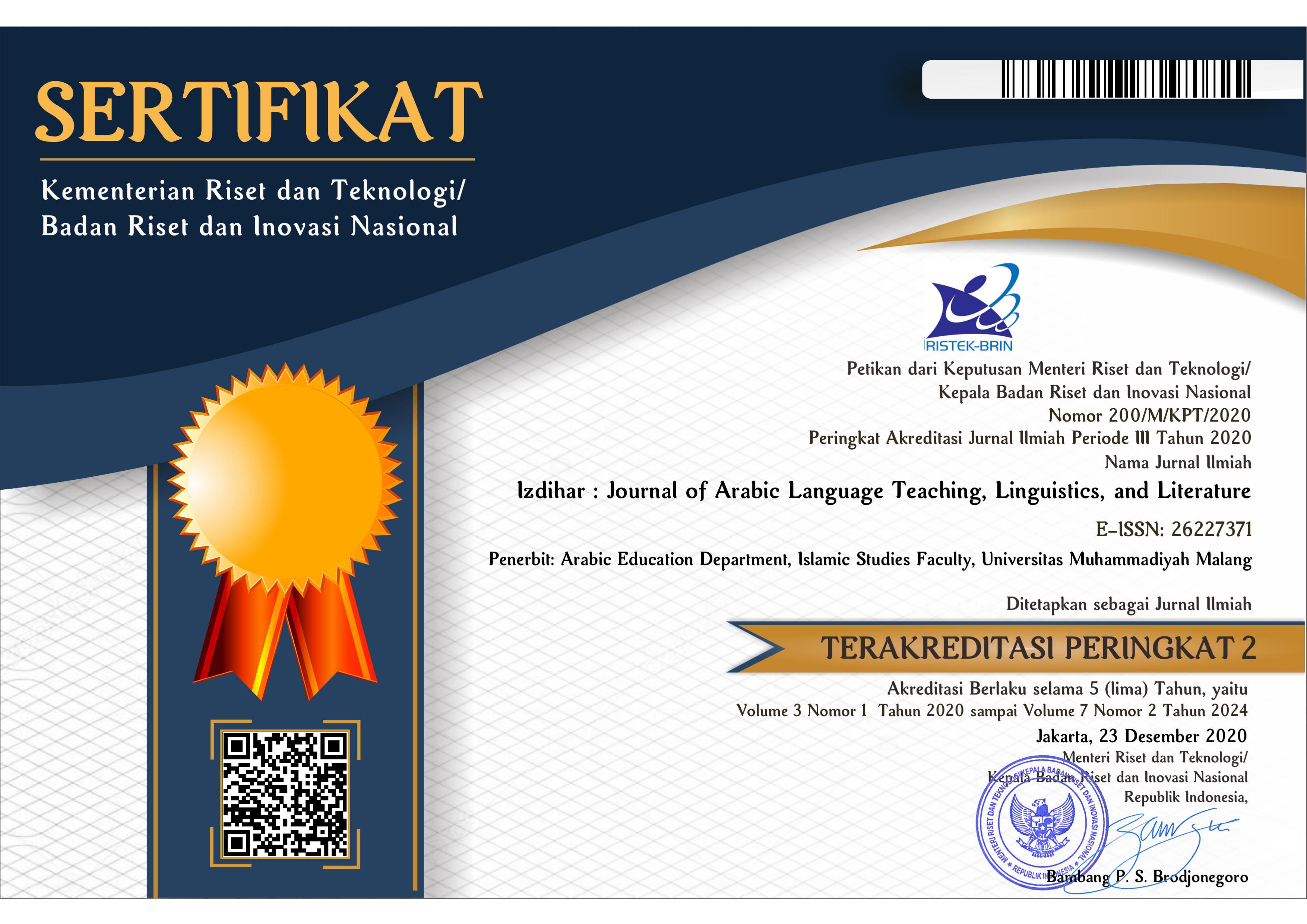Students’ Perception toward Social Media Assisted Language Learning (SMALL) for Arabic Learning
DOI:
https://doi.org/10.22219/jiz.v2i2.9911Keywords:
Arabic Language Teaching, Social Media, Students’ PerceptionAbstract
The aims of this research were to determine the perception of students of Arabic Language Department towards the use of social media in teaching Arabic language and determine social media often used by students to help in the process of teaching Arabic language. This study used social anthropology approach in qualitative research because this study focusses on student’s perceptions towads mobile as their assistant for learning Arabic. The subject of study are 32 Arabic language education students at the State Islamic University Maulana Malik Ibrahim Malang. The results of the study show that social media can be used as a tool for language learning Arabic, can improve students' skills, and help them better interact with lecturers and classmates.
Downloads
References
Afshari, M., Ghavifekr, S., Siraj, S., & Jing, D. (2013a). Students’ Attitudes towards Computer-assisted Language Learning. Procedia - Social and Behavioral Sciences, 103, 852–859. https://doi.org/10.1016/j.sbspro.2013.10.407
Afshari, M., Ghavifekr, S., Siraj, S., & Jing, D. (2013b). Students’ Attitudes towards Computer-assisted Language Learning. Procedia - Social and Behavioral Sciences, 103, 852–859. https://doi.org/10.1016/j.sbspro.2013.10.407
Baſöz, T. (2016). Pre-service EFL Teachers: Attitudes towards Language Learning through Social Media. Procedia - Social and Behavioral Sciences, 232, 430–438. https://doi.org/10.1016/j.sbspro.2016.10.059
English Language Centre, the Hong Kong Polytechnic University, Hong Kong, China, & Li, V. (2017). Social Media in English Language Teaching and Learning. International Journal of Learning and Teaching. https://doi.org/10.18178/ijlt.3.2.148-153
Eren, Ö. (2012). Students’ Attitudes towards Using Social Networking in Foreign Language Classes: A Facebook Example. International Journal of Business and Social Science 3(20), 8.
Fauzi, M. F. A., Irma. (2019). تطوير اللغز الرقمي لمادة التطبيق الصرفي 1 على الهاتف المحمول كالتدريبات الإضافية خارج الفصل الدراسي. Buletin Al-Turas, 25(1), 129-139. doi: https://doi.org/10.15408/bat.v25i1.11506
Hasibuan, A. A. (2018). Computer Mediated Communication, the Way for Developing Students’ Arabic Writing Ability. Computer Mediated Communication, 9.
Masqon, D. (2018). دور اللغة العربية في عصر العولمة وتطبيقها في تطوير العلوم. Izdihar : Journal of Arabic Language Teaching, Linguistics, and Literature, vol 1 no 2. https://doi.org/10.22219/izdihar.v1i1.6562
Miles, M. B., & Huberman, A. M. (1994). Qualitative Data Analysis. London: Sage Publication.
Murdiono, M. (2018). دراسة حالة عن ميول طلبة في تعلم اللغة العربية بالمدارس المتوسط الإسلامية بمالانج وباتو. Izdihar : Journal of Arabic Language Teaching, Linguistics, and Literature, vol 2. DOI: https://doi.org/10.22219/izdihar.v1i2.7297
Nugroho, A. (2018). The Analysis of Hoax Spread in Social Media. 23. https://doi.org/10.9790/0837-2306065060
Pirasteh, P. (2014). The Effectiveness of Computer-assisted Language Learning (CALL) on Learning Grammar by Iranian EFL Learners. Procedia - Social and Behavioral Sciences, 98, 1422–1427. https://doi.org/10.1016/j.sbspro.2014.03.561
Salih, A. A. A., & Elsaid, D. A. S. (2018). Students Attitude Towards the Use of Social Media for Learning Purposes (Case Study: Al-Baha University, College of Sciences & Arts- Biljurashi). Journal of LIterature, Language and Linguistics Vol 50, 7. ISSN 2422-8435
Watie, E. D. S. (2016). Komunikasi dan Media Sosial (Communications and Social Media). Jurnal The Messenger, 3(2), 69. https://doi.org/10.26623/themessenger.v3i2.270
Yurdagül, C., & Öz, S. (2018). Attitude towards Mobile Learning in English Language Education. Education Sciences, 8(3), 142. https://doi.org/10.3390/educsci8030142
Downloads
Published
How to Cite
Issue
Section
License
Copyright Notice
Authors who publish with this journal agree to the following terms:
- Authors retain copyright and grant the journal right of first publication with the work simultaneously licensed under a Creative Commons Attribution-ShareAlike 4.0 International License that allows others to share the work with an acknowledgment of the work's authorship and initial publication in this journal.
- Authors are able to enter into separate, additional contractual arrangements for the non-exclusive distribution of the journal's published version of the work (e.g., post it to an institutional repository or publish it in a book), with an acknowledgment of its initial publication in this journal.
- Authors are permitted and encouraged to post their work online (e.g., in institutional repositories or on their website) prior to and during the submission process, as it can lead to productive exchanges, as well as earlier and greater citation of published work (See The Effect of Open Access).
Copyright (c) 2019 Izdihar : Journal of Arabic Language Teaching, Linguistics, and Literature

This work is licensed under a Creative Commons Attribution-ShareAlike 4.0 International License.

















